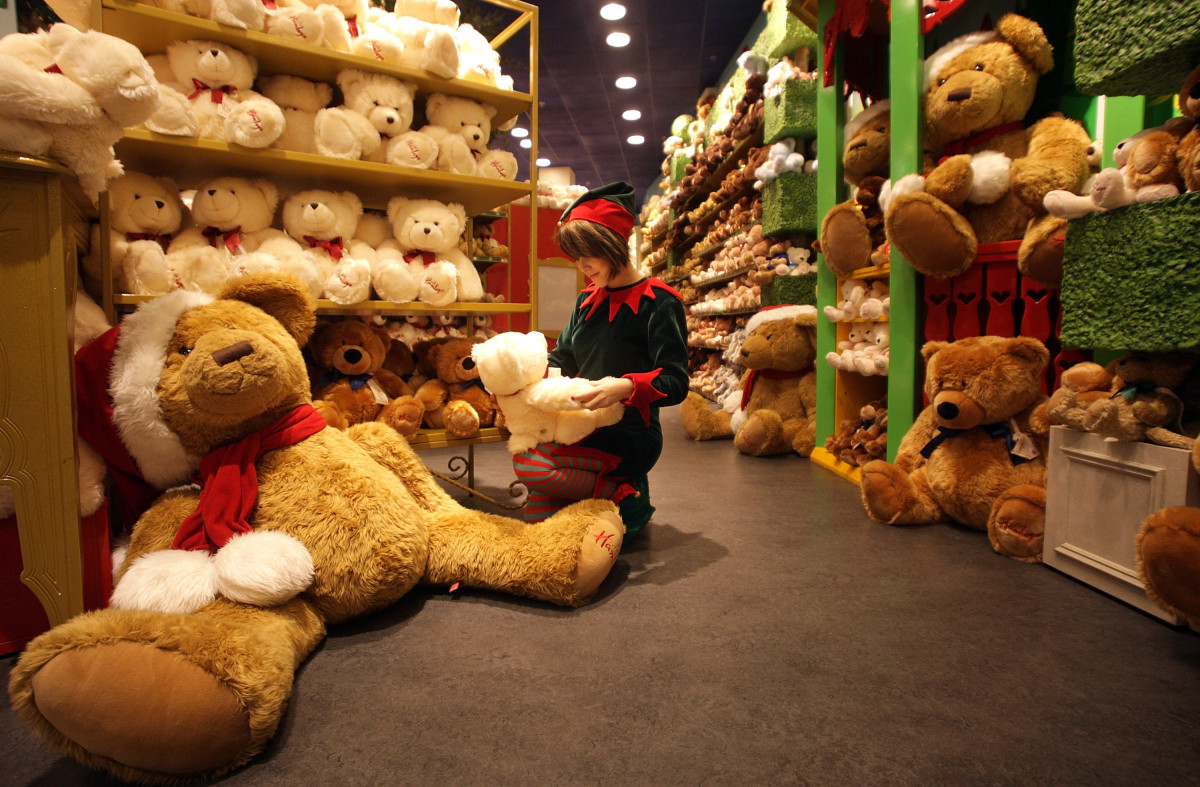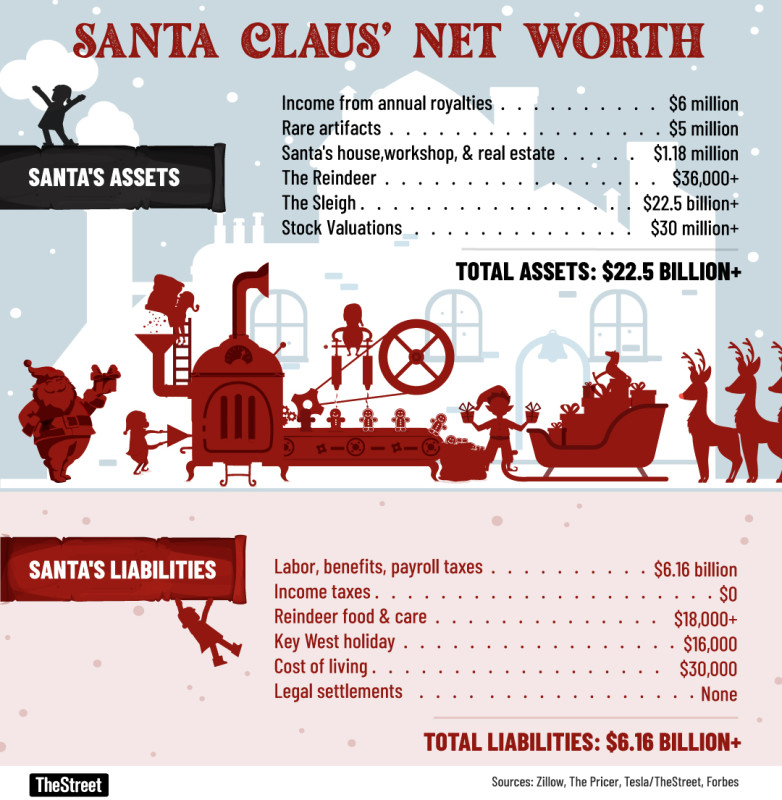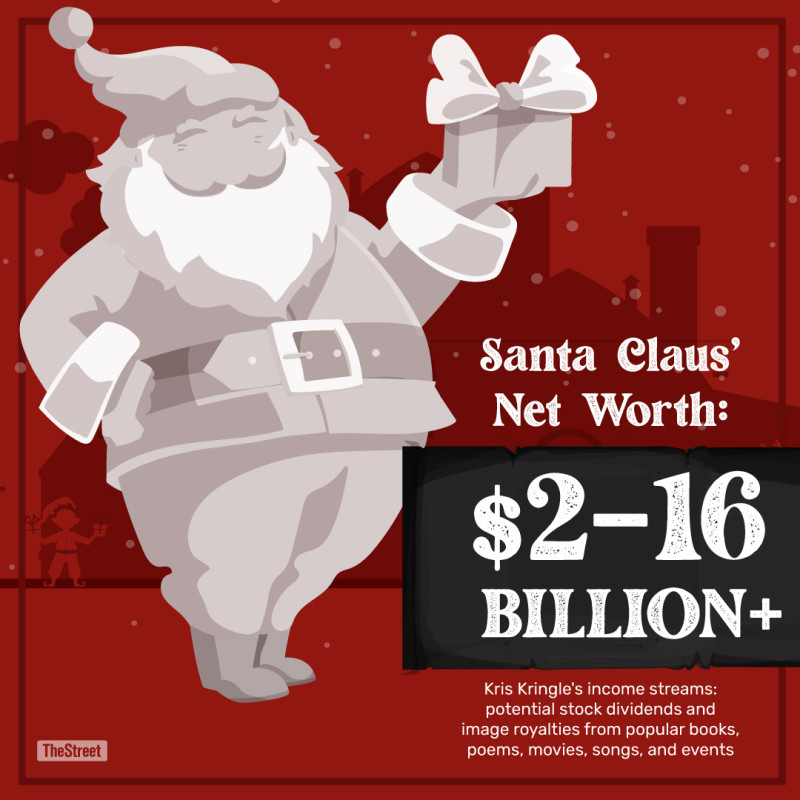
We think of Kris Kringle as a benevolent toy-giver who delivers his magic on one special night each year. But what's he up to on every other day of the year?
He's running one of the biggest toy factories in the world, of course. That's no small chore.
So, how much does it cost to keep the Workshop working? And how does Santa pay for it all? What is Santa Claus' net worth?
Some data points, like the value of Santa's sleigh and Workshop at the North Pole, are easy to figure out — assuming he owns everything outright and has no debt. Can you imagine charging Santa interest?
🎁🎅 Don't miss the move: Subscribe to TheStreet's free daily newsletter 🎅🎁
Still, our best guesses are based on limited information — after all, St. Nick's whole gig is based on mystique. But in the interest of avoiding any potential quibbles with Mr. Claus' legal team, please remember that the data here is entirely speculative.
Santa Claus' income: How does he make his money?
There are a few theories about Santa's salary. The first is purely historical. St. Nicholas was a monk in what is now Turkey who was known for giving all of his inherited wealth to the less fortunate. Legends tend to speak in absolutes, but our theory simply suggests that he gave away most of his wealth and invested the rest.
We're no antiquities experts, but just one everyday artifact from Patara (in modern-day Turkey) from AD 280 is probably worth a lot of money.
The second theory suggests that Father Christmas, one of the most recognizable figures worldwide, collects royalties on his iconic image. The classic holiday poem "'Twas Night Before Christmas" turns 200 years old this year. It marks the popularization of Santa Claus, the kindly spirit who delivers presents on Christmas Eve.
If we assume that Mr. Claus has been collecting on his image for two centuries, those royalty payments would undoubtedly stack up. Between movie likenesses, an international network of mall Santas, and radio jingles like "Santa, Baby" and "I Saw Mommy Kissing Santa Claus," St. Nick is the original Christmas season influencer.
If Mariah Carey makes an estimated $3 million each year on "All I Want for Christmas is You," Santa Claus could net at least twice that much. For argument's sake, let's say he makes $6 million in income for the legal rights to his name, image, and likeness (NIL) in December.

Santa Claus' assets
Here's a run-down of the major assets that contribute to St. Nick's impressive net worth:
Santa's Workshop at the North Pole & a cozy cottage for two
In 2017, property listing site Zillow clocked ol' St. Nick's home at a warm-and-cozy $657K. This year, the value of his property has jumped to $1.2 million. That's right: even Santa's two-bedroom, two-bath cottage has doubled in value over the last 7 years.
Check out the site for a 3D tour of the home, nestled on 25 acres of winter wonderland. The property includes a separate garage for storing the famous sleigh, a stable for his reindeer, and Santa's Workshop — where all the toys are made.
If Santa's home sounds a little too cozy, you could have twice the space and get a similar vibe in Santa Claus, Indiana — and have a coveted Snow Ball Lane address — for just $395K.
Santa's sleigh
Let's assume that Santa, whose home sits on one of the world's biggest ice caps, is very into electric energy. And he's going to need a whole lot of it if he's going to make it all the way around the world in one night. Ol' St. Nick's trusty elves could likely teach Tesla (TSLA) a thing or two about building EVs.
But for now, Kris Kringle is keeping his secret. As such, it's hard to guess the value of a flying sleigh carrying 325,000 tons (or more) of gifts around the world (more than 99,400 miles) in about ten hours. The closest thing we have to compare it to would be the Tesla Semi, which reportedly can go for 500 miles on a charge and is valued at around $250,000.
By those numbers, it would take a fleet of 200 Tesla Semis to make it around the world on Santa's sleigh's charge. Never mind that it would take almost 7,500 trucks to handle the weight. Also, never mind the speed limit.
By this estimation, Santa's sleigh would be worth a whopping $50 billion in today's auto market. This doesn't account for all the damage the sleigh takes on each yearly outing.
Your average Tesla car will depreciate to 45% of its original value over a decade. Santa's been at this game far longer than that, but let's give those mechanical engineering Elves at the Workshop their dues — accounting for depreciation, Santa's sleigh could be worth as much as $22.5 billion.
For leftover change, add on the sale value of nine domesticated adult reindeer for $36,000. That's not even speculating about how much value Rudolph's rare, bioluminescent nose would add.
Antiquities
In November 2022, several stolen artifacts were repatriated to Turkey. The trafficked artifacts included a life-size bronze statue of Roman Emperor Lucius Verus, estimated to have been sculpted sometime between CE 100 and 200. The statue is valued at $15 million.
Now, it's unlikely St. Nicolas would have stashed away a bunch of bronze tributes to royalty in his youth, what with all of the selfless giving. However, other items like jewelry and coins potentially have significant value today.
For argument's sake, let's say Santa Claus has a humble $5 million in antiquities that he keeps around for sentimental purposes.
Santa Claus' investment portfolio
There are a number of ways Jolly Old St. Nick could have invested his money over the years. International stock markets have been around since the 17th century, after all — and he's been around considerably longer.
Let's choose one stock that we already associate with the image of Santa: Coca-Cola (KO) . In 1931, Mr. Claus made arguably his most iconic appearance in a string of Coca-Cola ads drawn by Haddon Sundblom.

If Papa Noël got paid in shares, he'd be taking no losses on almost a century's worth of market growth. Say he was paid with 100 shares of Coca-Cola stock. In 1931, his shares were worth $1,182. After ten stock splits over nearly a century, today, Mr. Claus’ gains on his 460,800 Coke shares would total $29.3 million.
That’s just rising prices and stock splits — let’s assume a guy who makes a list and checks it twice would reinvest his dividends. Say dividends worked out to 0.2% of the stock prices over the years. So let's round it up and say Santa is worth well over $30 million in Coca-Cola stock alone.
Now think of every single company that has used Santa Claus’ image in its ads: Kraft-Heinz (KHC) , PepsiCo. (PEP) , Apple (AAPL) , General Motors (GM) , and so many more. If stock options were Kringle’s preferred method of payment, his capital gains would make Warren Buffett weep.

Santa's liabilities
Here's a roundup of the primary liabilities that must be subtracted from the value of Santa's assets to yield his net worth:
Elf jobs at the North Pole: How much does Santa pay?
Of course, the St. Nicholas of old is known for his generosity, so we know the elves are being paid a competitive rate. Toys for 800 million children don't just make themselves! Assuming each child gets two presents from ol' Kris Kringle, that's 1.6 billion toys each calendar year.
The official Santa Tracker estimates that at least 110,000 Elves are in Santa's employ. Their salaries, however, are a topic of great mystery. Some lore states that the Elves don't work for wages. That is, of course, not true. They've even got great insurance benefits — particularly dental.
Related: Snoop Dogg's net worth: The rapper's businesses, investments, & more
Unfortunately, unless there's a leaked memo from the North Pole's headquarters, it's hard to know just how much the Elves are paid for their work. If we make a guess based on the average salary of someone working in a nearby country, say, Iceland, then the 110,000 Elves might make an average of $56K annually, costing the Workshop about $6.16 billion.
Feeding the reindeer
Reindeer eat a lot. We're talking 9–18 pounds of vegetation per day — and the North Pole isn't exactly known for its greenery.
Owners of domesticated reindeer can expect to pay about $2,000 annually per nose. This means that it costs $18,000 a year to feed Dasher and Dancer and Prancer and Vixen and Comet and ... you get the idea.
More on celebrity net worth:
- How Al Pacino went from a net worth of $50 to broke
- Bruno Mars' net worth going into 2025
- Pamela Anderson's net worth: The millions she should have made
Cost of living
The average cost of living in nearby Iceland is about $1,240 per month. For Mr. and Mrs. Claus, everyone's favorite cozy couple, $2,500 would cover it, coming in at $30,000 annually.
Let's also assume that Santa and Mrs. Claus will need a vacation once the gifting season is over. These two lovebirds deserve to thaw out their fingers and toes along a beach in Key West — which will cost them about $16,000.
Lawsuits
This time of year, rumors often circulate about Santa's driving skills. While reports of Grandmas being "run over by a reindeer" have become a common urban legend, if the Big Guy has collided with anyone, the concerned parties settled out of court.

TheStreet
So, what is Santa Claus' net worth?
Assuming that jolly ol' St. Nicholas is debt-free, Santa's Workshop, in total, would need to gross at least $6.21 billion to keep the lights on at the North Pole.
One could estimate that Santa Claus' net worth is between $2 and $5 billion — and that's on the very low end. His face is one of the most recognizable figures across the world, and his brand is worth at least $1 billion alone.
So, based on our admittedly very rough guesswork, Santa Claus might be worth as much as $16 billion. After 200 years, he's never missed a delivery — a record that swells the goodwill on his balance sheet, adding to his net worth.

TheStreet
There is probably no CEO on the planet who is as committed to his mission as Santa Claus. If he didn't deliver on his promises, billions of people would be disappointed.
So far, he has not let the world down. Financially speaking, Santa has plenty of liabilities, but his net worth would definitely earn him a spot on Forbes' Billionaires List, so he's doing just fine.
Related: The 10 best investing books (according to stock market pros)







